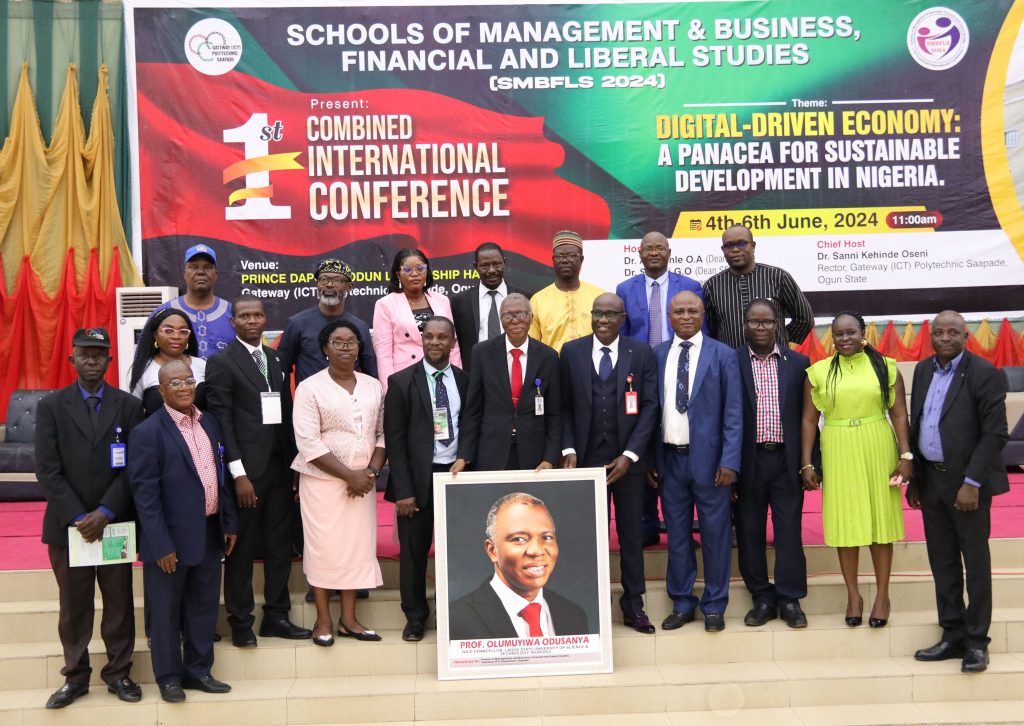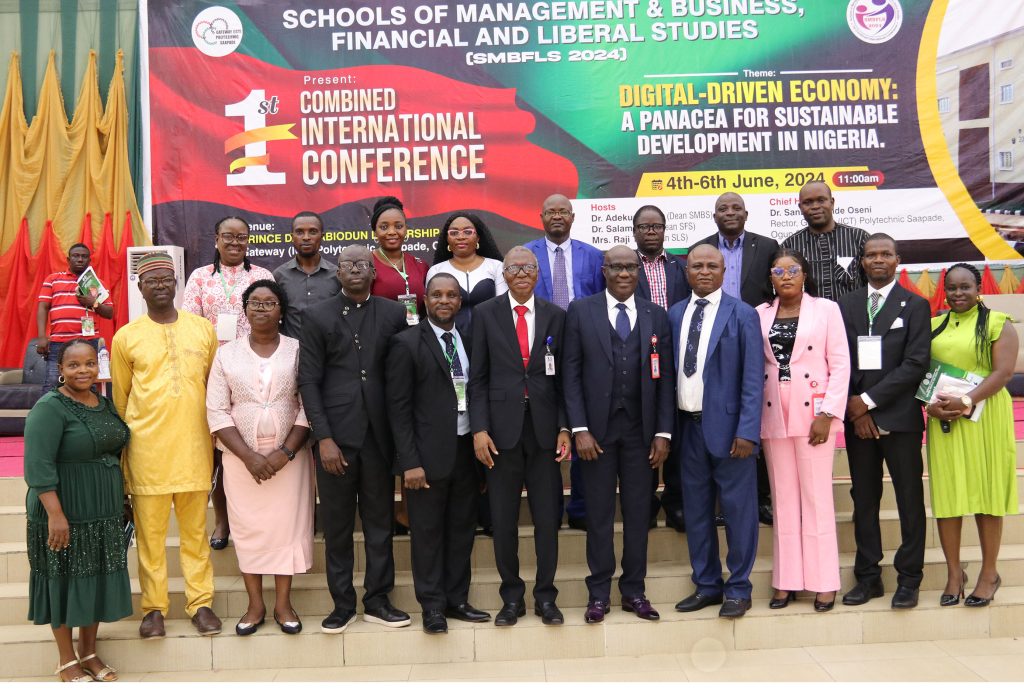
Experts charge Nigerians to implement policies for global digital advancements
Experts have said Nigerian will only foster a digital economy across all sectors only by implementing policies that support re-engineering in order to keep up with global digital advancements.
A digital economy is an economic activity that emerges from connecting individuals, businesses, devices, data, and processes through digital technology; a digital-driven economy can be a powerful catalyst for Nigerian’s sustainable development. By leveraging digital technologies, Nigerians can address many of its developmental challenges, create new economic opportunities, and enhance the well-being of the population.
This was revealed at an international conference themed Digital driven economy: A panacea for sustainable development in Nigeria at the Gateway (ICT) Polytechnic Saapade.
The keynote speaker, who is the chairman of FCMB plc., Mr Tola Mobolurin represented by the Group Managing Director of Capital Bancorp plc., Mr. Gbolahan Olojede stressed the need for collaboration maintaining that there is a need for a collaborative effort to align policies, share resources and create an innovative ecosystem for inclusive and sustainable growth by the Government, private sectors and Non-Governmental Organizations.
He emphasized that collaboration is a strong force that will assist Nigerians in tackling numerous developmental challenges, creating new economic opportunities, and improving the well-being of the population. He stressed that a digital-driven economy has the potential to broaden income sources by boosting sectors such as technology, services, and creative industries. In particular, the tech industry, including startups and digital entrepreneurship, can generate millions of jobs. This encompasses software development, digital marketing, e-commerce, and fintech, paving the way for new opportunities and reducing unemployment and underemployment. In the first quarter of 2023, the Information and Communications Technology (ICT) sector accounted for 17.47% of the country’s GDP, totaling NGN 3.1 trillion ($6.7 billion).
Other sectors mentioned were fintech, e-governance, digital health technology, and e-learning. He elaborated that digitization notably brings financial inclusion to the table. Digital financial solutions like mobile banking and fintech innovations can extend financial services to the unbanked population. This inclusion can empower small businesses, promote entrepreneurship, and facilitate improved individual financial planning.
According to the 2023 EFInA Access to Finance (A2F) Survey report, formal financial inclusion in Nigeria grew significantly from 56% in 2020 to 64% in 2023.
E-governance will enhance transparency, reduce corruption, and improve public service delivery. Digital platforms can streamline tax collection, licensing, and public procurement processes, making government operations more efficient and accountable. E-learning platforms and digital resources can revolutionize education by providing access to quality education and skill development programs across Nigeria. This can address educational disparities and equip the youth with skills relevant to the global digital economy.
Digital health technologies have revolutionized the traditional practice of caring for mothers. For instance, Babymigo is a web-based platform that offers expert-led information, tools, and resources through a community-led platform. It includes telemedicine and health information systems, which can improve healthcare access and delivery. Virtual consultations can benefit remote areas, and health data management can enhance disease surveillance and response.
Digital tools are also transforming agriculture through precision farming, access to market information, and supply chain management. Farmers can use mobile apps to access weather forecasts, best practices, and market prices, leading to improved productivity and income.
In the space of infrastructure development, investment in digital infrastructure such as broadband internet, data centres, and smart cities can spur development. A robust digital infrastructure is foundational for supporting various digital services and innovations.
The telecommunications and information services subs sector stood at NGN 2.84 trillion (around 3.64 billion U.S. dollars), representing the most valuable sector in the information and communication industry.
Nigeria’s economy has long been dependent on oil. A digital-driven economy can diversify income sources by boosting sectors such as technology, services, and creative industries. For example, motion pictures and music recordings accounted for about N154 billion of Nigeria’s GDP in 2023. This diversification can make the economy more resilient to global oil price fluctuations.
Collaboratively, the lead paper presenter who is also the Vice Chancellor of Lagos State University of Science and Technology, Professor Olumuyiwa Omotola Odusanya in his presentation highlighted the roles the digital economy plays in promoting industrial structure and upgrading total employment.

He quality life and a digital economy for everyone. He added that the digital economy offers numerous advantages including increased efficiency and innovation, job creation, improved customer experience, and reduced business cost through factors like transportation and corruption; which has led to increased profit and overall growth.
The Chief Host of the conference, Dr Sanni kehinde Oseni in his words said Gateway (ICT) Polytechnic has unwavering commitment to advancing knowledge for the digital economy.
He mentioned that the institution is making significant progress in understanding the digital economy and preparing its students and stakeholders with essential skills for the digital age. He stated, “the polytechnic is dedicated to advancing knowledge and understanding of the digital economy and its implications for sustainable development. Through research, teaching, and outreach activities, students and stakeholders are equipped with the knowledge and skills necessary to succeed in an increasingly digital world”. Expressing his optimism on the impacts of the conference, he described the “conference as a platform for meaningful dialogue and collaboration where opportunities can be explored, challenges be addressed and a chart of a course towards a more sustainable and inclusive future driven by the digital economy because it holds immense promise for driving economic and social progress”.
